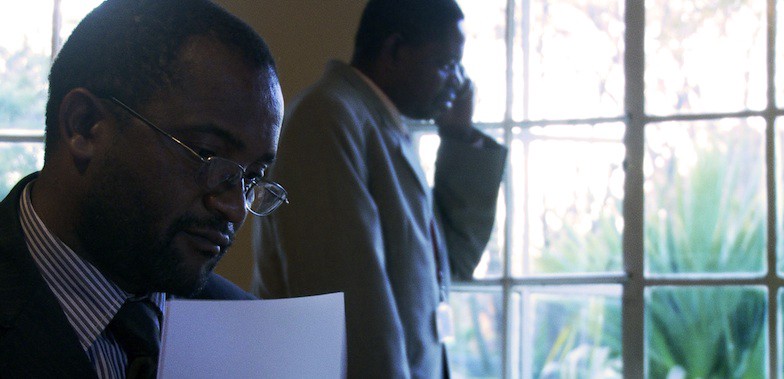Camilla Nielsson was trained as
a documentary filmmaker at the Tisch School of the Arts
and holds an M.A. in visual anthropology
from New York University (NYU).
The
award-winning filmmaker has directed the trilogy Good Morning Afghanistan
(2003), Durga (2004), and The Children of Darfur (2005), as well as Mumbai Disconnected (2009), part of the Cities on Speed series. Since 2007, she
has collaborated with the Israeli video artist Yael Bartana on the trilogy And Europe
Will Be Stunned (Venice
Biennale 2011), and Re:Constructed Landscapes (National Gallery of Denmark/CPH:DOX 2012).
Her feature debut, Democrats, is about
Zimbabwe’s power struggle for a new constitution. (Press materials)
Democrats will play at IDFA on November 23–26, 29, and 30.
W&H: Please give us your
description of the film playing.
CN: Following
one of Africa’s bloodiest elections, two political ememies are appointed to
write a new democratic constitution for Zimbabwe. It is the ultimate test that
could bring an end to President Mugabe’s more than 30 years of autocratic rule.
It can go either way: towards the birth of a constitutional democracy — or
renewed repression.
W&H: What drew you to this story?
CN: The fact that representations of Zimbabwe has long been one-sided and
very unnuanced, always confirming the same cliché. I was hoping to tell a
different story about African politics than one about corruption and victims
with no real agency. Also, what drew me to the story was the two main characters.
Two politically and ideologically opposed men, forced on a joint mission to
save the country from decades of political and economic misery. They were given a Sisyphean task, and they invited me along for the ride.
W&H: What was the biggest challenge
in making the film?
CN: The
biggest challenge in making this film was filming a politically sensitive
story in a country with a long history of both censorship and banning of foreign
media. Also, being a country with no tradition for observational documentary
filmmaking, roaming around in Zimbabwe as a white documentary-film crew, we
caused quiet a circus at times, and our saftey was often at risk.
W&H: What do you want people to think about when they are leaving
the theater?
CN: That democracy and the basic human rights that we
often take for granted in our part of the world is something that is still
being fought for in countries like Zimbabwe.
W&H: What
advice do you have for other female directors?
CN: If
anything, I think in my own case it has often been an advantage to be a woman,
especially in some of the difficult places I have made my films. I think a male
director would have had much more resistance in terms of access.
W&H: What’s
the biggest misconception about you and your work?
CN: That
someone with a background in anthropology makes boring academic films, and that
an anthropological approach to filmmaking is less artistic than that of
someone who has been trained in a traditional film-school environment.
W&H: How
did you get your film funded?
CN: Pitching
a film about a constitution-making process in Africa was a hard sell. Democrats
was funded by many different sources, but mainly by the Danish Film Institute,
ITVS, and some very courageous broadcasters like Mette Hoffman from DR and Nick
Fraser from the BBC. As commissioning editors, they took a great risk by investing very
generously in the early development stage of this film.
W&H: Name
your favorite woman-directed film and why.
CN: I
have always admired Kim Longinotto’s work very much — the humanity and
universality with which she embraces all her stories. And also Pirjo Honkasalo
for her brave artistic choices.







